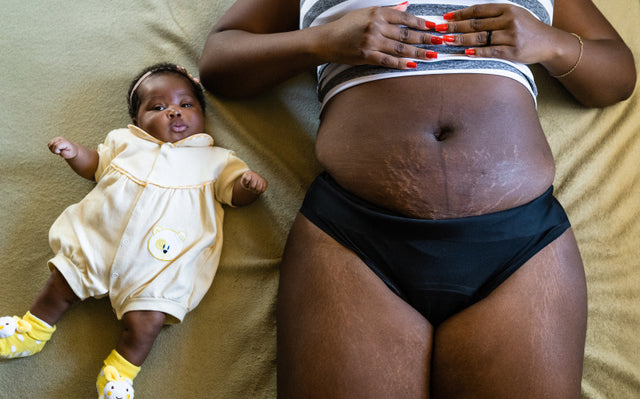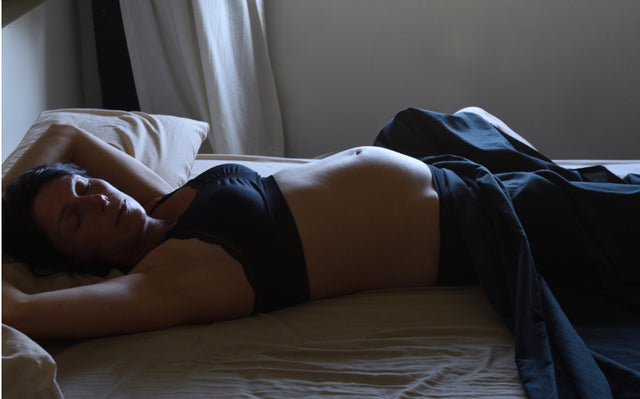The beginning of a pregnancy triggers some big physical and chemical changes in your body. Symptoms in the first trimester can range from morning sickness to night sweats and mood swings, but one lesser-talked-about phenomenon is early pregnancy discharge.
In this article, we chat with Dr Andrea Huddleston to find out what early pregnancy discharge is, how it differs from premenstrual discharge and the best ways to manage it.
What is early pregnancy discharge?
Vaginal discharge is a normal, mucus-like body fluid that keeps your vulva and vagina moist. It might leave some wetness or chalk-coloured stains on your underwear, and how much you get and what it looks like can be different for everyone.
An increase in vaginal discharge is known as leukorrhea (also spelled ‘leucorrhoea’). Although not always the case, leukorrhea might mean you’re pregnant.
“Leukorrhea can be one of the earliest signs of pregnancy that women will actually notice,” Dr Andrea says. “But it does depend on how well they know the subtle changes of their normal cervical mucus throughout their cycle.”
According to Dr Andrea, there are a couple of reasons why you get more vaginal discharge in early pregnancy.
“Firstly, pregnancy causes a big increase in our estrogen hormone production, and estrogen allows for more blood flow to the vagina,” she says. “It also stimulates the mucus membranes of the cervix in the vagina, which is where this mucus comes from.
“Secondly, increased mucus production is actually a protective mechanism. When there is a developing embryo in the uterus, that’s a very vulnerable time for the uterus. So, the body will make a lot of immunological changes to protect the embryo as much as possible.
“One of the ways that it does this is by increasing the cervical mucus so that nothing can actually pass into the uterus that could compromise the pregnancy.”
Leukorrhea is also the vagina’s natural way of keeping clean and healthy.
“Part of the purpose of leukorrhea is to clear away any dead cells that shouldn’t be there, tightly maintain the pH of the vagina and protect the cervix and the uterus from any foreign substances or infection,” Dr Andrea says.
“So it’s quite a clever, in-built protective mechanism of the body.”
What’s the difference between discharge before your period vs early pregnancy?
Leukorrhea in early pregnancy might look a little different to the discharge you usually have throughout your menstrual cycle.
“Throughout your cycle, because of normal hormonal fluctuations, your cervical mucus will change,” Dr Andrea says. “Around ovulation, we tend to see a flexible, stringy sort of discharge with a raw-egg-white type of consistency.
“This does vary from person to person, but discharge changes throughout the cycle should be fairly consistent for each individual.”
Understanding Signs & Symptoms of Early Pregnancy Discharge
Similarly to the discharge before your period, a clear or creamy white early pregnancy discharge is very normal. A healthy pregnancy discharge smell isn’t strong or unpleasant. And the consistency should be more thin than thick. In most cases, the main difference between discharge before your period versus early pregnancy is that there’s simply more of it.
But what if it does smell bad – or just kinda strange? This could be a sign of infection (such as vaginal thrush), so make an appointment with your doctor. It’s also important to seek medical advice if your discharge:
- has a yellow, green or red tinge
- is watery, frothy or looks like cottage cheese
- is accompanied by itching, redness or soreness around your vagina.
What are some ways to manage early pregnancy discharge?
Leukorrhea in early pregnancy shows up differently for everyone. Some people might feel surprised or alarmed, or they might barely notice it at all. Whatever you’re feeling, know that it’s a totally normal result of your pregnancy hormones doing their thing.
“A person produces more estrogen in one pregnancy than they would in the entirety of their cycling life,” Dr Andrea points out. “So, it’s really no wonder we get unusual symptoms like this.”
When early pregnancy discharge is clear, cream-coloured or white and smells fine, there should be nothing to worry about.
However, if the extra wetness is bothering you or making you anxious, there are some things you can do to manage it:
- Bathe or shower regularly, using gentle soap and warm water.
- Don’t use vaginal wipes, douches or chemical soaps, as these can mess with the delicate pH balance of the vagina and increase your risk of infection.
- Tight clothing and synthetic fabrics can trap moisture and cause bacterial overgrowth. Instead, wear loose clothing and breathable, comfortable briefs (like the ones in Modibodi’s Pregnancy collection).
- Look into taking a pregnancy-specific oral probiotic to help maintain a healthy vagina.
- Eat a healthy diet rich in protein, good fats and fibre to support vaginal health and reduce your risk of infection. Research suggests that eating less refined sugar can help with this, too.
- Check in with your doctor if you’re worried something’s not quite right.
Slip into something more comfortable
Leukorrhea in early pregnancy is completely natural – it’s just one of several bodily changes to expect when you’re expecting. If the extra moisture is annoying or worrying you, why not check out Modibodi’s pregnancy range? Our underwear features a special absorbent lining to soak up any fluids, keeping you comfy and protected as you go about your day.








